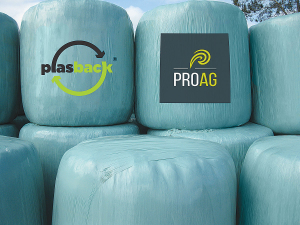Government approves nationwide recycling scheme for primary sector plastics
Rural recycling scheme Agrecovery is welcoming the Government's approval of regulations for a nationwide rural recycling scheme for agrichemicals and farm plastics.
 ProAg-Wearparts is the third major distributor of hay and silage nets to join Plasback on-farm plastics recycling scheme.
ProAg-Wearparts is the third major distributor of hay and silage nets to join Plasback on-farm plastics recycling scheme.
Nationwide crop packaging distributor ProAg-Wearparts has joined the Plasback on-farm plastics recycling scheme.
By doing so, it becomes the third significant distributor of hay and silage nets, twines and wraps to join the Plasback scheme in 2022.
ProAg-Wearparts development manager Nathan Wycherley says the company joined Plasback to support its customers and the wider agricultural industry as they work to establish world-leading sustainability practices.
"We have been concerned about the life cycle of agricultural plastic for some time, and today there is much more awareness of the issue among farmers and the public," Wycherley says.
Plasback is currently the only government-approved product stewarship scheme in the country that deals with silage film.
Wycherley says Plasback has invested a lot of money to build up their service.
"We hope that our support will help them continue to develop a collection service that is economically viable to our customers and provides more efficient processing of used silage wrap."
Plasback commercial manager Neal Shaw applauds the leadership shown by ProAg and the other agricultural consumables suppliers that have joined the scheme.
"Now that ProAg has joined us, we have the support of the suppliers of more than 90% of the stretch film and silage covers sold in New Zealand.
"It sends a clear message to the wider industry and government that this sector is serious about recycling and product stewardship."
Shaw says that the Ministry for the Environment has set a target date of June 2024 to have a mandatory, industry-wide product stewarship scheme in place for all agricultural plastics.
Discussion about the shape of that scheme are now underway. Plasback wants to ensure any levies applied do not significantly increase the amount that farmers have to pay to cover the cost of recycling.
"Plasback has shown that when farmers and suppliers directly cover some of the cost of collection and reprocessing, it is possible to provide an efficient, cost-effective service. We want this model to be part of any future product stewardship scheme," Shaw says.
"Now that virtually all Kiwi silage wrap distributors are part of Plasback, we can advocate on their behalf and on behalf of industry bodies, such as Fonterra, that support our service."
Bigger, Better
Former Manawatu sheep, beef and deer farmer John Wycherley established ProAg in 2010. In 2018 ProAg acquired and merged with ag machinery parts supplier Wearparts.
Today ProAg-Wearparts provides wearing parts and crop packaging throughout New Zealand from their central base in Feilding and storage and dispatch centres in Dunedin, Christchurch and Auckland.
In addition to ProAg, the other companies that have become Plasback sponsors this year are Webbline and Integrated Packaging. Companies that joined the scheme prior to that are Grevilla Ag Tulloch Farm Machines, Nutritech, Donaghys and Agpac.
Shaw says as the pressure on farmers to deal with their waste plastic builds, some potential recyclers may look to cut corners by collecting loose plastic rather than use Plasback's bin and liner system. This can reduce the value of the waste plastic to manufacturers because it is dirty and more difficult to deal with.
"The bin and liner system we introduced to New Zealand almost 16 years ago works well, and the factories we sell to appreciate it. We don't want to see the New Zealand get a reputation for supplying low-quality recyclables."
The third edition of the NZ Dairy Expo, held in mid-February in Matamata, has shown that the KISS principle (keep it simple stupid) was getting a positive response from exhibitors and visitors alike.
Twenty years ago, South African dairy farm manager Louis Vandenberg was sent to a farm in Waikato to provide training on Afimilk technology.
Strong farmgate milk price is helping boost investment on farms, says PGG Wrightson chief executive Stephen Guerin.
Fonterra's 460 milk suppliers in Australia, who will switch to Lactalis end of this month, are unfazed with the impending change.
The 5+ A Day Charitable Trust has launched a collection of affordable recipes designed to turn everyday vegetables into seasonal stars.
Jane Mellsopp has been confirmed as the new Government Appointee to the New Zealand Meat Board (NZMB).
OPINION: Staying with politics, with less than nine months to go before the general elections, there’s confusion in the Labour…
OPINION: Winston Peters' tirade against the free trade deal stitched with India may not be all political posturing by the…